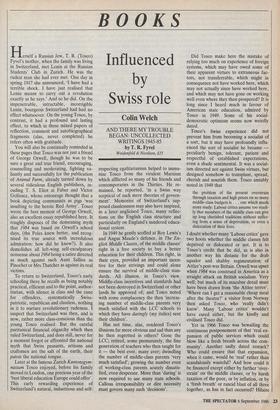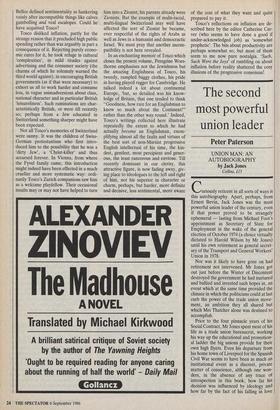BOOKS
Influenced by Swiss role
Colin Welch
AND THERE MY TROUBLE BEGAN: UNCOLLECTED WRITINGS 1945-85 by T. R. Fyvel Herself a Russian Jew, T. R. (Tosco) Fyvel's mother, when the family was living in Switzerland, met Lenin at the Russian Students' Club in Zurich. He was the rudest man she had ever met. One day in spring 1917 she announced, 'I have had a terrible shock. I have just realised that Lenin means to carry out a revolution exactly as he says.' And so he did. On the impenetrable, intractable, incorrigible Lenin, bourgeois Switzerland had had no effect whatsoever. On the young Tosco, by contrast, it had a profound and lasting effect, to which in these mixed papers of reflection, comment and autobiographical fragments (alas, never completed) he refers often with gratitude.
You will also be continually reminded in these pages that Tosco was not just a friend of George Orwell, though he was to be sure a great and true friend, encouraging, counselling and moderating, fighting va- liantly and successfully for the publication of Animal Farm, already turned down by several ridiculous English publishers, in- cuding T. S. Eliot at Faber and Victor Gollancz, whose entourage thought that a book depicting communists as pigs `was insulting to the heroic Red Army'. Tosco wrote the best memoir of George Orwell, also an excellent essay republished here. It roughly disposes of the demeaning myth that 1984 was based on Orwell's school days, (the Poles knew better, and recog- nised its true source with incredulous admiration: how did he know?). It also demolishes all left-wing self-exculpatory nonsense about 1984 being a satire directed as much against such Aunt Sallies as Pinochet or Mrs Thatcher as against its real victims, To return to Switzerland, Tosco's early schooling there he recalls as being notably practical, efficient and to the point, author- itarian, with silence in class and the cane for offenders, systematically Swiss- patriotic, republican and classless, nothing in it to nurture revolutionary rudeness. I suspect that Switzerland was then, and is now, rather more class-conscious than the young Tosco realised. But the careful puritanical financial oligarchy which then ruled Switzerland, and does still, never for a moment forgot or affronted the national myth that Swiss peasants, artisans and craftsmen are the salt of the earth, their patois the national tongue.
Later at the famous Zurich Kantonsgym- nasium Tosco enjoyed, before his family moved to London, one precious year of the `best liberal education Europe could offer'. This early rewarding experience of Switzerland's natural, industrious and self-
Weidenfeld & Nicolson, £15
respecting egalitarianism helped to immu- nise Tosco from the virulent Marxism which afflicted so many of his friends and contemporaries in the Thirties. He re- mained, he reported, 'in a Swiss way sceptical of such mere theories of govern- ment'. Memories of Switzerland's sup- posed classlessness may also have inspired, in a later anglicised Tosco, many reflec- tions on the English class structure and particularly on England's sundered educa- tional system.
In 1949 he gently scoffed at Roy Lewis's and Angus Maude's defence, in The En- glish Middle Classes, of the middle classes' right in a free society to buy a better education for their children. This right, in their eyes, provided an important incen- tive for their strivings and could alone ensure the survival of middle-class stan- dards. All illusion, in Tosco's view. Middle-class incentives and standards had not been destroyed in Switzerland or other lands he approved of; and Tosco noted with some complacency the then 'increas- ing number of middle-class parents very much satisfied with the LCC schools to which they have daringly (my italics) sent their children'.
Has not time, alas, rendered Tosco's illusions far more obvious and sad than any he then regretted in others? Gone the LCC; retired, some prematurely, the fine generation of teachers who then taught for it — the best ever, many aver; dwindling the number of middle-class parents 'very much satisfied'; growing the number even of working-class parents acutely dissatis- fied, even desperate. More than 'daring' is now required to use many state schools. Callous irresponsibility or dire necessity must govern many such 'decisions'. Did Tosco make here the mistake of relying too much on experience of foreign systems, which may have owed some of their apparent virtues to extraneous fac- tors, not transferrable, which might in consequence not have worked here, which may not actually since have worked here, and which may not have gone on working well even where they then prospered? It is long since I heard much in favour of American state education, admired by Tosco in 1949. Some of his social- democratic optimism seems now weirdly dated.
Tosco's Swiss experience did not prevent him from becoming a socialist of a sort, but it may have profoundly influ- enced the sort of socialist he became — peculiarly benign, tolerant, patient and respectful of established expectations, even a shade sentimental. It was a social- ism directed not against Swiss virtues, but designed somehow to transplant, spread, cherish and nourish them. Tosco amiably noted in 1949 that the problem of the present overstrain through taxation and high prices on so many middle-class budgets is . . one which needs more study: Labour critics assume too readi- ly that members of the middle class can give up long cherished traditions without suffer- ing from a sense of deprivation, or even a dislocation of their lives.
I doubt whether many 'Labour critics' gave two hoots whether the middle classes felt deprived or dislocated or not. It is to Tosco's credit that he did, as is also in another way his distaste for the drab squalor and shabby regimentation of Attlee's post-war Britain. Orwell was upset when 1984 was construed in America as a straight attack on British socialism. Very well; but much of its macabre detail must have been drawn from 'the Attlee terror'. `Where can I get a reasonable cheap meal after the theatre?' a visitor from Norway then asked Tosco, who 'really didn't know'. Many 'Labour critics' wouldn't have cared either, but the kindly and civilised Tosco did.
Yet in 1966 Tosco was bewailing the continuous postponement of that 'real ex- pansion of public services which could blow like a fresh breath across the com- munity'. Another sadly dated remark? Who could ensure that that expansion, when it came, would be 'real' rather than scandalously wasteful? And how could it be financed except either by further 'over- strain' on the middle classes, or by harsh taxation of the poor, or by inflation, or by a 'fresh breath' or rancid blast of all three together, as has in fact occurred? Hilaire Belloc defined sentimentality as hankering vainly after incompatible things like calves gambolling and veal escalopes. Could he have acquitted Tosco?
Tosco disliked inflation, partly for the strange reason that it precluded high public spending rather than was arguably in part a consequence of it. Rejecting purely econo- mic cures for it, he took refuge in cultural 'complexities', in mild tirades against advertising and the consumer society (the charms of which he solemnly warned the third world against), in encouraging British governments (as if that were necessary) to exhort us all to work harder and consume less, in vague animadversions about class, national character and in particular British 'leisureliness'. Such ruminations are char- acteristically British, or were till recently so; perhaps from a Jew educated in Switzerland something sharper might have been expected.
Not all Tosco's memories of Switzerland were sunny. It was the children of Swiss- German protestantism who first intro- duced him to the possibility that he was a `dirty Jew', a `Christ-killer' and thus accursed forever. In Vienna, from where the Fyvel family came, this introduction might indeed have been effected in a much crueller and more systematic way: ordi- narily Tosco's Zurich companions saw him as a welcome playfellow. Their occasional insults may or may not have helped to turn
him into a Zionist; his parents already were Zionists. But the example of multi-racial, multi-lingual Switzerland may well have affected the sort of Zionist he became, ever respectful of the rights of Arabs as well as Jews in a humanist and democractic Israel. We must pray that another incom- patibility is not here revealed.
In an enchanting memoir of Tosco which closes the present volume, Peregrine Wors- thorne emphasises not the Jewishness but the amazing Englishness of Tosco, his tweedy, rumpled baggy clothes, his pride in having played rugger for Cambridge. He talked indeed a lot about continental Europe, 'but, so detailed was his know- ledge of Britain, that one tended to think "Goodness, how rare for an Englishman to know so much about the Continent!" rather than the other way round.' Indeed, Tosco's writings collected here illustrate repeatedly the extent to which he had actually become an Englishman, exem- plifying almost all the faults and virtues of the best sort of non-Marxist progressive English intellectual of his time, the kin- dest, gentlest, most percipient and gener- ous, the least rancorous and envious. Till recently dominant in our clerisy, this attractive figure, is now fading away, giv- ing place to ideologues to the left and right of him, not his superior in character or charm, perhaps, but harder, more definite and decisive, less sentimental, more aware
of the cost of what they want and quite prepared to pay it.
Tosco's reflections on inflation are de- scribed here by the editor Catherine Car- ver (who seems to have done a good if under-acknowledged job) as 'somewhat prophetic'. The bits about productivity are perhaps somewhat so; but most of them seem to me now pure nostalgia. 'Such, Such Were the Joys' of rumbling on about inflation before reality shattered the cosy illusions of the progressive consensus!







































 Previous page
Previous page